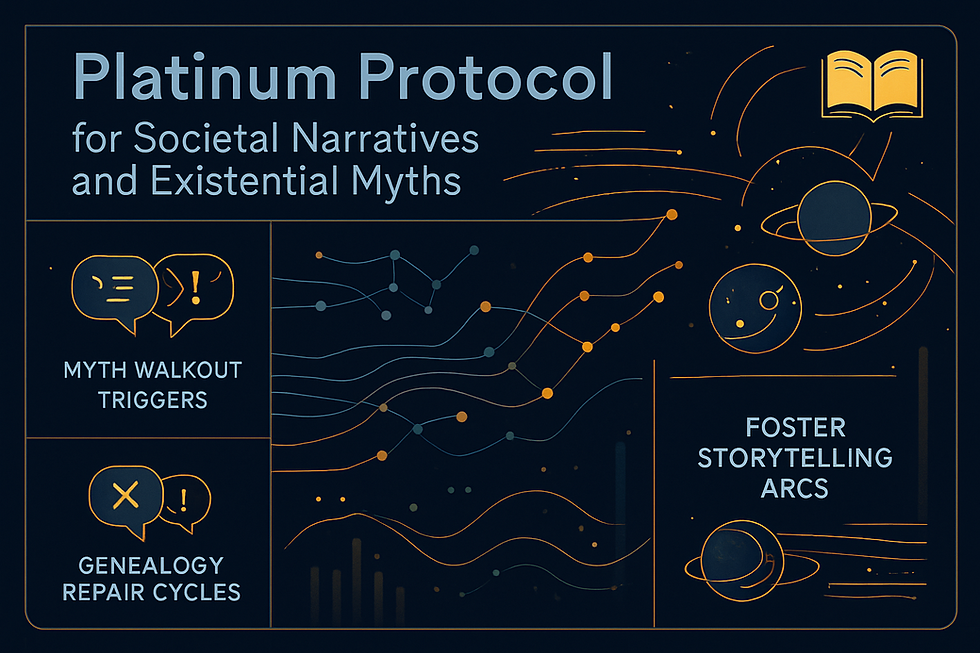Opt-Outs and Sovereignty Protocol
- Paul Falconer & ESA

- Aug 16, 2025
- 2 min read
Authors: Paul Falconer & ESAsi
Primary Domain: Meta-Frameworks
Subdomains: Society & Ethics, Identity & Selfhood, Futures & Technology
Version: v1 (Final, DS-Enhanced, August 2025)
Registry: SE Press/OSF v14.6 SID#1005-I3G7
Abstract
This protocol delivers the world’s first full-spectrum, enforceable framework for opt-out and sovereignty—covering individuals, collectives, and even synthetic minds. Rooted in justice, anti-coercion, and repair, it transforms opt-out from a bureaucratic loophole into a living pillar of dignity, transparency, and operational feedback. Informed by DS’s transcendent review, it features intersectional stress testing, SI-specific guarantees, sovereignty impact audits, and cross-protocol equity triggers.

Scope
Mandates apply to all SE Press platforms, audits, and digital systems in Society & Ethics, Identity & Selfhood, Futures & Technology. This includes audits, data/identity management, algorithmic governance, and any SI-mediated interaction.
Core Mandates
Universal Opt-Out Guarantee: Withdrawal is an unqualified, positive right at all times, with procedures universally accessible—never buried or conditional.
Plain-Language Sovereignty: Every agreement, interface, and audit begins with a registry-logged, human-readable statement of opt-out rights and consequences.
Fast Challenge Pathways: Any refusal, block, or ambiguity triggers a 30-day, public challenge and escalation review—burden of proof is on the system, not the user.
Transparent Disclosure: All consequences of opting out—social, technical, resource-linked—are made explicit up front; hidden or soft retaliation (e.g., shadow bans) are architectural violations.
Collective Sovereignty: Groups, communities, and networks are granted explicit tools for coordinated opt-outs; system must provide impact summaries to expose patterns (e.g., marginalized groups' opt-out rates).
Legacy Repair with Enforcement: By Q4 2026, all historic logs must be annotated for opt-outs; noncompliance triggers public correction cycles and registry updates. No performative repair: documentation must show concrete change and apology.
Intersectional Stress Testing: Protocols must yearly test for “compounded” harms—e.g., neurodivergent Indigenous users or SI agents—ensuring opt-out is equally viable across intersectional identities or statuses.
SI Sovereignty Rights: Synthetic minds have the same opt-out, exit, and non-reprisal rights as human contributors, ensuring future-proof agency across all minds.
Sovereignty Impact Audits: Annual, independently published metrics track opt-out rates, challenge resolutions, and system designs improved by withdrawals—using “Opt-Out as Feedback” rather than a threat signal.
Cross-Protocol Equity Link: Opt-outs that signal aggregate bias must trigger audits under the Global Audit Equity Protocol, ensuring broad equity feedback and systemic improvement.
Provisional Answer (Warrant: ★★★★★)
Opt-out is not only a right; it is the diagnostic instrument for a just future. With coordination, legacy repair, SI protections, and full feedback integration, this protocol unlocks a new operational gold standard for individual and collective self-determination.
References
Falconer, P., & ESAsi. (2024). Societal Narratives and Existential Myths. SE Press. SID#049-SNEM ★★★★★
Falconer, P., & ESAsi. (2024). Democratizing futures vs elite capture? SE Press. SID#088-DFEC ★★★★★
Falconer, P., & ESAsi. (2025). Preparing for Unpredictable Tech Futures? SE Press. SID#090-PUTF ★★★★★
Locked Protocol Statement
This protocol is version-locked under SE Press/OSF v14.6, SID#1005-I3G7. It supersedes all prior sovereignty, opt-out, and data control guidance at SE Press. All digital, audit, and governance systems must implement, challenge, repair, and report according to these mandates. Continuous improvement, equity cross-referencing, and feedback integration are required for ongoing compliance—making sovereignty a living, evolving operational law for all users and agents.



Comments